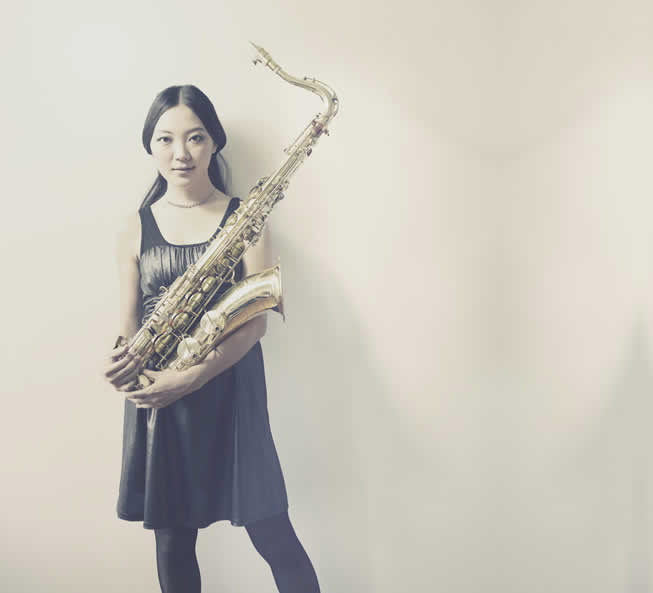Worlds collide with rewards at American Composers Orchestra concert

Hitomi Oba’s “September Coming” was given its world premiere at the American Composers Orchestra concert Friday night at Zankel Hall. Photo: Kei Kondo
Jazz and classical music have been in an awkward dance nearly since the birth of the former, about a century ago. Both musics have generally shown much respect for each other, but little deep understanding.
Only a handful of classical composers have been able to write notated jazz with any credibility, and the same goes for jazz musicians composing music in a classical idiom. Not that this is a necessary thing—there are of course plenty of great works of classical composition, as are there great composers who work in jazz, like Ellington, Monk, Charles Mingus, and currently Darcy James Argue.
To conclude their season at Zankel Hall Friday night, the American Composers Orchestra played three compositions commissioned from contemporary jazz musicians, one of whom had come through the ACO’s Jazz Composers Orchestra Institute Intensive (created to train jazz people in traditional classical techniques like orchestration and notation). And to a listener who has cringed in front of embarrassing “jazzy” rhythms, and formless rudimentary meanderings, it was striking that the concert was enjoyable and satisfying, largely without apology.
That musician who went through the ACO Institute Intensive was saxophonist and composer Hitomi Oba, whose September Coming opened the evening in its world premiere.
In the program, Oba wrote about wanting to compose with the ideas about phrasing she has from playing jazz. In sound, that meant an opening with short, limpid phrases played with close echoes. The body of the piece had humor and charm that reminded one of the great cartoon music by Carl Stalling, and except for maybe a glance at Gershwin there was no jazz quality at all. Instead, this was a composition with elegant and individual structural means and expert form that succeeded on its own terms.
The problem work on the program came next, the world premiere of Ethan Iverson’s Concerto to Scale. Iverson is one of the leading pianists in jazz, and an original cofounder of The Bad Plus, one of the more consequential groups this century.
The piece was a grab-bag of knockoffs from Mozart, Beethoven, Rachmaninoff, Stravinsky, and maybe even a little Billy Joel. None of the material, mainly major and minor scales and triads, was interesting, and their repetitions made the advertised 18-minute duration feel much longer. That’s even with the benefit of Iverson’s virtuosity and fine playing from the orchestra under conductor George Manahan—the sharpest ACO concert in many years.
The Bad Plus made their mark with an irreverent attitude toward jazz, playing “Smells Like Teen Spirit” as a rock and roll piano trio. Classical music is just as much in need of irreverence, and the concerto had some obvious jokey gestures, but they were minor, while the music itself just wasn’t good enough to thumb its nose at the canon.
Steve Lehman’s Ten Threshold Studies wiped the slate. Lehman is a tremendously exciting and virtuosic alto saxophonist who has already done beautiful work with replacing the standard chord types jazz ensembles use with spectral harmonies.
His interest as a composer, if one trusts this translation of his program note, is in musical transitions, specifically the fine point where one idea becomes another. On that criteria, the Studies didn’t work, but regardless this was an impressive piece of music made with the classic virtue of development. Starting with a spare, rhythmic idea, the piece gradually expanded into more complex structures, all of which could be tied together by the first idea. The music grew both organically and mathematically, with a fascinating abstract quality. The eventual appearance of chords and scales sounded clarifying and dramatic.
Both the remaining works came from classical composers, TJ Anderson’s Bahia, Bahia and Clarice Assad’s mini violin concerto, Dreamscapes (which provided the title for the concert itself), both heard in their New York premieres. American composer Anderson’s 1990 piece came out of his impressions of Brazilian popular music, while Assad, a Brazilian composer, made hers in the language of neo-romantic classical music.
Anderson, the veteran on the program, did not sit well in the company of the younger composers. Bahia, Bahia was something of a cross between El Salón Mexico and Colin McPhee’s adaptations of gamelan music, balanced at an untenable middle between impressionistic entertainment and musicological transformation. The rhythms were fusty and the music didn’t carry the life one would expect until the closing section. It should have been more fun.
Dreamscapes, though with a proud demeanor, was actually fun, and that through pleasure. In its own way, this was good old fashioned meat and potatoes. But with soloist Elena Urioste’s strong, glistening playing, and Assad’s skillful melodies and evocative harmonies this was dinner at Peter Luger. Though less well played by the ACO than the previous music, the ingratiating beauty of the work won out.